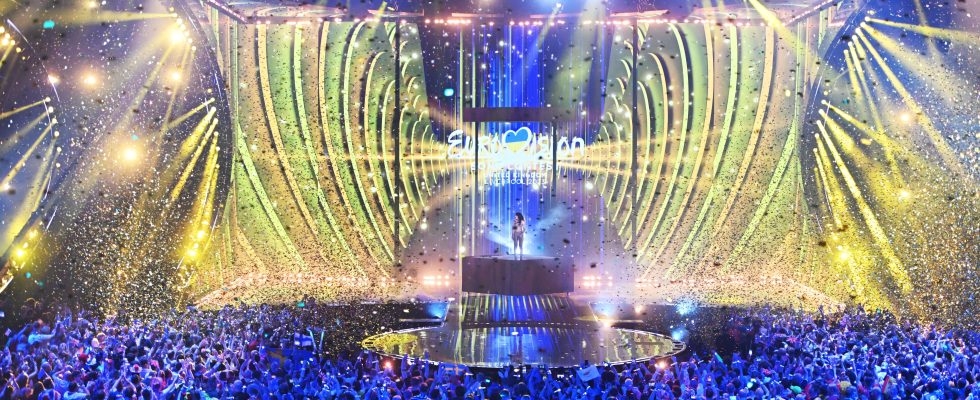The conflict in Gaza found its way into American universities, courts, feminist demonstrations, the latest climate conference, the 49th Caesars ceremony… There was no reason for Eurovision to be an exception. The competition, accustomed for a long time to making the split between ABBA and geopolitics, has been plagued for several weeks by a controversy surrounding Israel. The artist Eden Golan was chosen to represent the Jewish state on May 11 in Malmö, Sweden. However, its participation is not yet assured. In question, the lyrics of his song, considered too political by the organization. Which reminds on its website : Eurovision “is a non-political event. All participating broadcasters, including the host broadcaster, will be responsible for ensuring […] so that the competition is in no way politicized…”. No political message. Of which note. What exactly do the organizers criticize about the first version of the title October Rain (October Rain) presented by Israel? Some passages refer too explicitly to the Hamas attack on October 7. Here they are. Everyone will judge: “Someone stole the moon tonight, took my light, everything is black and white. […] There’s no more air to breathe… They were all good children, every single one of them.”
After initially refusing to change the excerpts in question, the Israeli public broadcasting company (KAN) backed down, agreeing to revise its copy several times. “At a time when those who hate us are trying to oust us and boycott the State of Israel on every stage, Israel must make its voice heard, its head held high and its flag fly in all global forums, especially this year,” Israeli President Isaac Herzog said. Last Sunday, KAN finally announced that it would send a new title, Hurricane (Hurricane). Same refrain asOctober Rain but the song, which will be officially unveiled on March 10, now evokes a young woman “going through a personal crisis”. It remains to be seen whether these changes will this time be approved by the authorities of the largest musical competition in the world. Has Eurovision been overzealous in this matter? The question can be asked on several grounds. The message ofOctober Rain does it have a stronger political connotation than 1944, the title that brought Jamala to victory in 2016? The Ukrainian artist, tremendously emotional on stage, two years after the annexation of Crimea by the Russians, was she not singing about the Tatars, a minority people of Crimea who were victims of the atrocities of the Stalinist regime? More logical, with regard to the regulations, was the decision to revoke the Georgian song presented in 2009 with a title in the form of a nod to the current Russian president: We Don’t Wanna Put In.
When a candidate calls for a boycott of Israel
Eurovision prides itself on being an apoliticized competition. But what is it really? What to say, for example, of the at least political appeal of the Irish candidate responding to the sweet name of “Bambi Thug” (“Bambi thug”), who advocates boycott of Israel this year because of the bombings in Gaza? A flexibility that Volodymyr Zelensky did not benefit from last year. The Ukrainian president wanted to send a message to the public via a video on the evening of the grand final organized in Liverpool. Impossible, the organizers of the event replied, a decision which had aroused the incomprehension of the British government. “The values and freedoms that President Zelensky and his people are fighting for in Ukraine are not political, but fundamental […]. The organizers of Eurovision themselves recognized this last year by suspending Russia’s participation in the competition,” a spokesperson for Prime Minister Rishi Sunak said at the time. From what leaked to the press , nothing indicates, to date, that the initial words ofOctober Rain contained any message of hostility, whether towards Hamas, the Palestinians or any government entity. Perhaps it would have been symbolic for this great festive event to allow a country still ravaged by terrorism, to celebrate, in music, the memory of these hundreds of young people who, let us remember, lost their lives because they were Jews. and for having had the misfortune of participating in a music festival, in the wrong place, at the wrong time. Eurovision has been waving tolerance as its standard since its creation. Showcase the values of openness of our Old Continent to which Israel, the first non-European country to have participated in the competition, four victories under the belt, has contributed so much. Let us remember the visibility brought worldwide in 1998 by the triumph of Dana International on the transgender issue or the feminist dimension of Netta’s coronation twenty years later.
However, let us recognize the courage of the organizers of Eurovision in not having given in to pressure from demonstrators and artists, particularly Scandinavian ones, who demanded the exclusion of Israel for this 2024 edition. Because, as American journalist Anthony Grant points out, ” For Israelis, participating in Eurovision means connecting to the continent in a way devoid of politics.” October Rain or not, let’s bet that the final of May 11 will be sprinkled with politics. Greece will award 12 points to Cyprus. Sweden 12 points to Norway. Switzerland a few points behind France. And perhaps we will hear it played again, like last year, the magnificent cover of the Liverpool anthem, You’ll Never Walk Alone (You will never walk alone) in support of our Ukrainian neighbors. Eurovision, an apolitical competition which has not finished sending messages…
